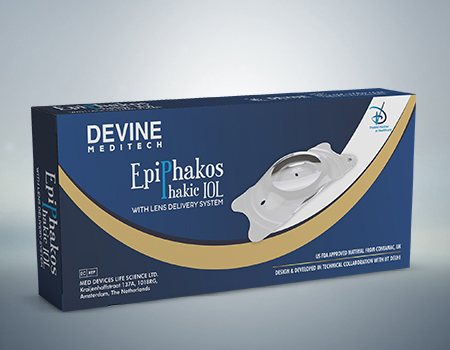
Phakic intraocular lens (IOL) implantation is a revolutionary surgical technique aimed at correcting moderate to severe myopia in individuals who are not suitable candidates for LASIK or other refractive procedures. This procedure involves placing a specialized lens between the cornea and the natural lens, providing enhanced vision without altering the cornea's structure. While the benefits are remarkable, it is essential to understand that, like any surgical procedure, Phakic IOL implantation carries certain risks.
At Devine Meditech, we take pride in offering the most technologically advanced and best Phakic IOL lenses in India, equipped with superior optical parameters to ensure the best outcomes. However, we strongly recommend that every candidate thoroughly understand the boundaries and potential hazards of this surgery before making a decision. By being well-informed, patients can better prepare for the procedure and minimize the chances of adverse effects.
Although Phakic IOLs offer numerous benefits, they may also pose certain risks. Here are some potential complications associated with the surgery:
1. Vision Loss
Some individuals may experience irreversible vision loss after Phakic IOL surgery. This loss may not be correctable with glasses, contact lenses, or further surgery. In rare cases, the degree of vision loss can be significant.
2. Debilitating Visual Issues
Patients might experience visual disturbances such as glare, halos, double vision, or shadows. These issues can be particularly troublesome in low-light conditions, making tasks like night driving or navigating in foggy environments challenging.
3. Additional Surgeries
In some cases, additional procedures may be necessary to adjust, replace, or remove the implanted lens. This may occur if the lens power is incorrect, the lens shifts from its intended position, or it causes severe visual issues. Each subsequent surgery comes with its own risks.
4. Under-correction and over-correction
Achieving perfect 20/20 vision post-surgery is not guaranteed. The implanted lens’s power may not precisely match the patient’s requirements, leading to under- or over-correction. Patients may still need glasses or contact lenses for certain activities, such as reading.
5. Increased Intraocular Pressure (IOP)
Elevated pressure inside the eye is a potential side effect. Persistent high IOP may require long-term glaucoma treatment or additional surgery to prevent vision loss.
6. Cataract Development
Phakic IOL surgery may accelerate the formation of cataracts—a clouding of the natural lens. If a cataract develops to the point of significantly impairing vision, additional surgery will be needed to remove both the natural and implanted lenses.

Phakic IOL surgery offers a promising solution for individuals with significant refractive errors who are not eligible for LASIK or PRK procedures. By addressing conditions such as myopia, hyperopia, and astigmatism, this surgery can significantly enhance visual acuity and improve the quality of life. However, it is essential to approach the decision with caution and thorough understanding.
Patients considering this procedure should undergo comprehensive pre-operative assessments and consult with experienced ophthalmologists to evaluate their suitability and understand the associated risks. Despite the potential drawbacks, Phakic IOL surgery remains a viable and effective option for many, particularly those with unique vision correction needs. Advances in technology and surgical techniques continue to improve the safety and efficacy of the procedure, making it an increasingly attractive choice for restoring clear vision. At Devine Meditech, we are committed to providing the best lenses in India to ensure safe and effective outcomes for all our patients.